unit_1_课后题答案
- 格式:ppt
- 大小:362.00 KB
- 文档页数:22
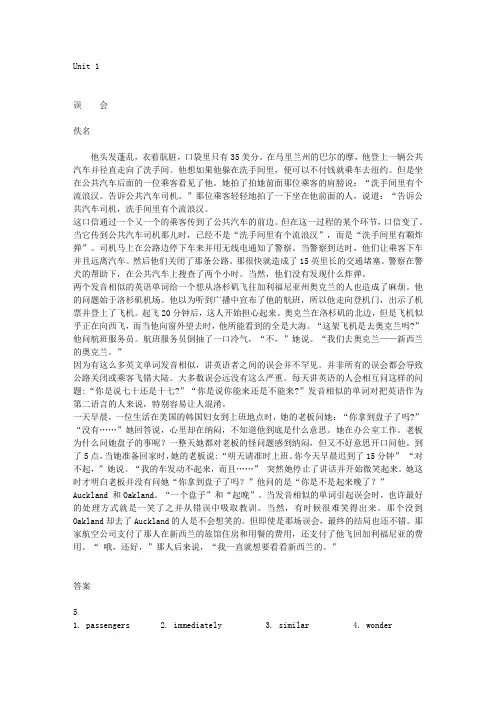
Unit 1误会佚名他头发蓬乱,衣着肮脏,口袋里只有35美分。
在马里兰州的巴尔的摩,他登上一辆公共汽车并径直走向了洗手间。
他想如果他躲在洗手间里,便可以不付钱就乘车去纽约。
但是坐在公共汽车后面的一位乘客看见了他。
她拍了拍她前面那位乘客的肩膀说:“洗手间里有个流浪汉。
告诉公共汽车司机。
”那位乘客轻轻地拍了一下坐在他前面的人,说道:“告诉公共汽车司机,洗手间里有个流浪汉。
这口信通过一个又一个的乘客传到了公共汽车的前边。
但在这一过程的某个环节,口信变了。
当它传到公共汽车司机那儿时,已经不是“洗手间里有个流浪汉”,而是“洗手间里有颗炸弹”。
司机马上在公路边停下车来并用无线电通知了警察。
当警察到达时,他们让乘客下车并且远离汽车。
然后他们关闭了那条公路。
那很快就造成了15英里长的交通堵塞。
警察在警犬的帮助下,在公共汽车上搜查了两个小时。
当然,他们没有发现什么炸弹。
两个发音相似的英语单词给一个想从洛杉矶飞往加利福尼亚州奥克兰的人也造成了麻烦。
他的问题始于洛杉矶机场。
他以为听到广播中宣布了他的航班,所以他走向登机门,出示了机票并登上了飞机。
起飞20分钟后,这人开始担心起来。
奥克兰在洛杉矶的北边,但是飞机似乎正在向西飞,而当他向窗外望去时,他所能看到的全是大海。
“这架飞机是去奥克兰吗?”他问航班服务员。
航班服务员倒抽了一口冷气,“不,”她说。
“我们去奥克兰——新西兰的奥克兰。
”因为有这么多英文单词发音相似,讲英语者之间的误会并不罕见。
并非所有的误会都会导致公路关闭或乘客飞错大陆。
大多数误会远没有这么严重。
每天讲英语的人会相互问这样的问题:“你是说七十还是十七?”“你是说你能来还是不能来?”发音相似的单词对把英语作为第二语言的人来说,特别容易让人混淆。
一天早晨,一位生活在美国的韩国妇女到上班地点时,她的老板问她:“你拿到盘子了吗?” “没有……”她回答说,心里却在纳闷,不知道他到底是什么意思。
她在办公室工作。
老板为什么问她盘子的事呢?一整天她都对老板的怪问题感到纳闷,但又不好意思开口问他。
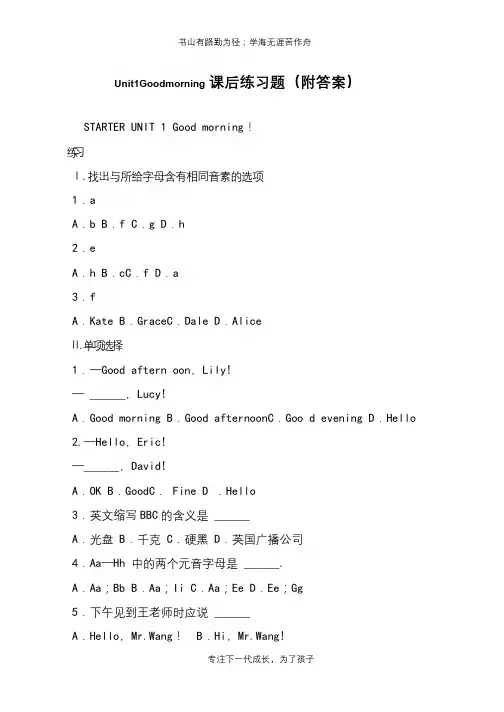
Unit1Goodmorning课后练习题(附答案)STARTER UNIT 1 Good morning!练习Ⅰ.找出与所给字母含有相同音素的选项1.aA.b B.f C.g D.h2.eA.h B.cC.f D.a3.fA.Kate B.GraceC.Dale D.AliceⅡ.单项选择1.—Good aftern oon,Lily!— ______,Lucy!A.Good morning B.Good afternoonC.Goo d evening D.Hello 2.—Hello,Eric!—______,David!A.OK B.GoodC.Fine D .Hello3.英文缩写BBC的含义是______A.光盘B.千克C.硬黑D.英国广播公司4.Aa—Hh 中的两个元音字母是______.A.Aa;Bb B.Aa;Ii C.Aa;Ee D.Ee;Gg5.下午见到王老师时应说______A.Hello,Mr.Wang!B.Hi,Mr.Wang!C.How a re you?D.G ood afternoon,Mr.Wang! Ⅲ.补全对话A:__1__ morning,Alice!B:Good morning,Bob!A:__2_ _ are you?B:I’m __3__,__4__.How are you?A:I’m fine,__5__.Ⅳ.从Ⅱ栏中找出Ⅰ栏中的正确答语Ⅰ1.Good morning!2.How are you?3.Good evening,Cindy!4.Hello,Bob!5.Good afternoon!ⅡA.Good afternoon!B.Hi,Eric!C.Good eve ning,Frank!D.I’m f ine,thanks.E.Good morning!参考答案Ⅰ.DBAⅡ.BDDCDⅢ. 1.Good 2.How 3.fine 4.thanks 5.tooⅣ. 1.E 2.D 3.C 4.B 5.A。
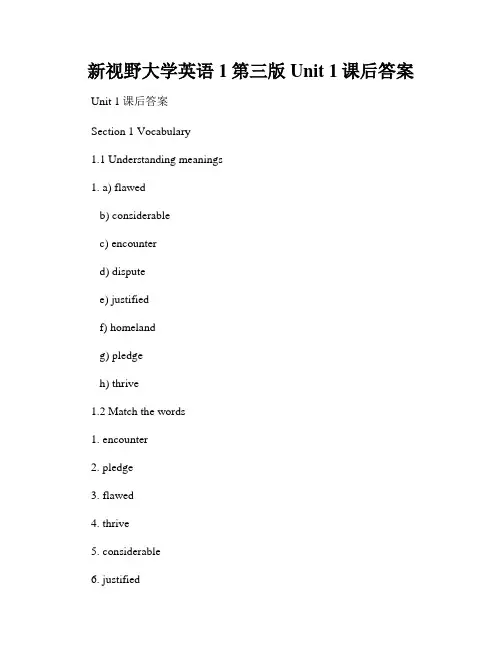
新视野大学英语1第三版Unit 1课后答案Unit 1课后答案Section 1 Vocabulary1.1 Understanding meanings1. a) flawedb) considerablec) encounterd) disputee) justifiedf) homelandg) pledgeh) thrive1.2 Match the words1. encounter2. pledge3. flawed4. thrive5. considerable6. justified7. dispute8. homelandSection 2 Listening2.1 Understanding relationships1. A. professor and student2. D. friends3. B. neighbors4. C. colleagues5. B. customer and salesperson 2.2 Understanding statements1. T2. F3. T4. F5. T2.3 Completing conversations1. flatmates2. architecture3. graduation4. internship5. roommateSection 3 Language focus3.1 Practical English1. b) meeting2. a) freshman3. d) unite4. c) challenge5. e) informative6. f) sights3.2 Word building1. exceptional2. creativity3. friendship4. dramatic5. comfortable6. informativeSection 4 Speaking4.1 Talking about personal experiencesI once encountered a major challenge during my freshman year of university. I was assigned a project that required substantial research and analytical skills. At first, I felt overwhelmed, but with determination and hard work, I was able to overcome the obstacles. It was a rewarding experience that taught me valuable lessons about perseverance and the importance of seeking help when needed.4.2 Role playA: Hi, I noticed you're new here. Are you a freshman?B: Yes, I just started my first year of university.A: That's great! Have you encountered any challenges so far?B: Well, I have trouble managing my time effectively. There are so many assignments and deadlines.A: I understand. It can be overwhelming at first. Have you considered seeking help from a tutor or attending time management workshops?B: Yes, I've thought about it. I think I'll give it a try. Thanks for the suggestion!A: You're welcome! Don't hesitate to reach out if you need any more advice or support.Section 5 Reading5.1 Completing sentences1. R2. F3. NG4. NF5. R5.2 Identifying main ideas1. B2. C3. A5.3 Matching headings1. E2. G3. D4. A5. F6. C7. BSection 6 WritingThroughout history, humanity has encountered numerous challenges and conflicts. From political disputes to personal struggles, we have faced it all. However, it is through these challenges that we are able to grow, learn, and thrive.One significant example of a challenge that people often encounter is in their academic journey. As a freshman in university, many students feel the pressure to adapt to the rigorous demands of higher education. Assignments, exams, and time management become major obstacles that they must overcome. However, with determination and perseverance, students can flourish and succeed in their studies.Another challenge that individuals may face is in their personal relationships. Whether it be a dispute with a friend, a disagreement with a family member, or difficulties in finding a life partner, relationships often present challenges. Learning how to communicate effectively, compromise, and understand different perspectives are vital skills in overcoming these obstacles and maintaining healthy relationships.Furthermore, challenges can also arise in professional settings. From starting a new job to pursuing a career change, individuals often encounter obstacles in their professional development. However, with the right mindset and a willingness to learn, one can navigate these challenges and even turn them into opportunities for growth.In conclusion, challenges are an inevitable part of life. They test our resilience, foster personal growth, and provide opportunities for learning. Whether it be in academics, relationships, or professional pursuits, overcoming obstacles is essential for success. Embracing challenges allows us to broaden our perspectives, develop new skills, and ultimately thrive in all aspects of life.。
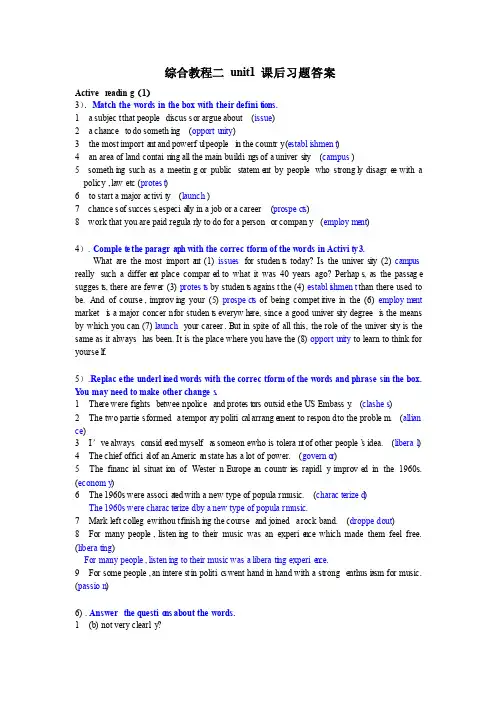
综合教程二unit1 课后习题答案Activer eading(1)3).Match the words in the box with their definitions.1 a subject that peopledi scuss or argue about (issue)2 a chanceto do somethi ng (opportu nity)3 the most importa nt and powerfu l peoplei n the country (establi shment)4 an area of land contain i ng all the main buildin gs of a universi ty (campus)5 somethi ng such as a meeting or publicstateme nt by people who strongl y disagre e with a policy, law etc (protest)6 to start a major activit y (launch)7 chances of success, especia l ly in a job or a career(prospect s)8 work that you are paid regularl y to do for a personor company(employm ent)4). Complete the paragrap h with the correct form of the words in Activity 3.What are the most importa nt (1)issuesfor student s today? Is the universi ty (2)campusreallysuch a differe nt place compare d to what it was 40 years ago? Perhaps, as the passage suggest s, there are fewer (3) protest s by student s against the (4) establi s hment than there used to be. And of course, improvi ng your (5)prospect s of being competi tive in the (6) employm ent marketi s a major concern for student s everywh ere, since a good universi ty degreei s the means by which you can (7) launchyour career. But in spite of all this, the role of the universi ty is the same as it alwayshas been. It is the place where you have the (8) opportu ni ty to learn to think for yoursel f.5).Replace the underli ned words with the correct form of the words and phrases in the box. Y ou may need to make other changes.1 There were fightsbetween policeand protest ors outside the US Embassy. (clashes)2 The two parties formed a tempora ry political arrange ment to respond to the problem. (alliance)3 I’ve alwaysconside red myselfa s someone who is toleran t of other people’s idea. (liberal)4 The chief officia l of an America n state has a lot of power. (governo r)5 The financi al situati on of Western Europea n countri es rapidly improve d in the 1960s. (economy)6 The 1960s were associa ted with a new type of popular music. (characterized)The 1960s were characterized by a new type of popular music.7 Mark left college without finishi ng the courseand joined a rock band. (dropped out)8 For many people, listeni ng to their music was an experie n ce which made them feel free. (liberati ng)For many people, listeni ng to their music was a liberati ng experie n ce.9 For some people, an interest in politic s went hand in hand with a strongenthusi asm for music. (passion)6) . Answer the questio ns about the words.1 (b) not very clearly?2 (a) active?3 (b) who disagre es publicl y with the governm ent?4 (b) not interested in it?5 (b) excitin g?6 (a) get smaller?7 (a) often in touch with them?8 (b) great pleasure?Activer eading 23).Match the words in the box with their definitions.1.rebel2.era3.destruction4.gender5.assert6.philoso phy7.industrial4).Complet e the conversa tionw ith the correct form of the words in Activity 3.1.rebel2.assert3.era4.industrial5.philoso phy6.gender7.destruction5).Answer the questio ns about the words and express ions.1.a2.a3.a4.a5.b6.a7.b8.bLanguag e in useplet e the sentenc es with the words in bracket s and the suffix-ment or -ism.1. What is the going to do about this problem? (govern)Correct answer:governm ent2. refersto a contemp oraryway of thinkin g, and is not easy to define. (postmod ern)Correct answer: Postmod ernism3. Post-war economi c led to the creatio n of new univers itiesin the 1960s. (develop)Correct answer: develop ment4. We must combatmoney worship and extreme. (individ ual)Correct answer: individ ualism5. The two groupsdiscuss ed for a long time, but couldn't reach an . (agree)Correct answer: agreeme nt6. The best we can make for the futureis to provide opportu nities for the younger generat ion. (invest)Correct answer: investm ent7. is the beliefthat men and women shouldbe treated differe ntly. (sex)Correct answer: Sexism8. The of Wordswo rth is evident in his poem on the FrenchRevolut ion. (romanti c)Correct answer: romanti cism2.Rewrite the sentenc es using so / neither / nor + inversi on. Followthe example.1. The world has changed a lot since the 1960s. Univers itieshave changed a lot, too.Suggest ed answer:The world has changed a lot since the 1960s, and so have univers ities.2. I reallyenjoyed my years at univers ity. Jackiealso enjoyed the time she spent at univers ity. Suggest ed answer:I reallyenjoyed my years at univers ity, and so did Jackie.3. Choosin g the right courseis alwaysa major problem for new student s. Another major problem is organiz ing one's time on campus.Suggest ed answer:Choosin g the right courseis alwaysa major problem for new student s, and so is organiz ing one's time on campus.4. I'm thinkin g of going to the lecture on post-colonia l literat ure. Li Ming is thinkin g of going, too. Suggest ed answer:I'm thinkin g of going to the lecture on post-colonia l literat ure, and so is Li Ming.5. I think the facilit ies in our college have improve d over the last few years. In my opinion the teachin g has also got better.Suggest ed answer:I think the facilit ies in our college have improve d over the last few years, and so has the teachin g.6. We can accessthe Interne t in our student hostel, and it's the same for everyon e else on campus. Suggest ed answer:We can accessthe Interne t in our student hostel, and so can everyon e else on campus.7. I'm not very interes ted in politic s. My friends aren't either.Suggest ed answer:I'm not very interes ted in politic s, nor are my friends.8. I won't be doing much tonight. My roommat e won't be doing much either.Suggest ed answer:I won't be doing much tonight, nor will my roommat e.3.Rewrite the sentenc es using mean. Followthe example.1. When you start out at college you meet lots of interes ting people.Suggest ed answer:Startin g out at college means meeting lots of interes ting people.2. If you go to bed too late you won't be able to concent rate the next day.Suggest ed answer:Going to bed too late means not being able to concent rate the next day.3. When you do a coursein Lit Theoryyou spend a lot of time on difficu lt subject s.Suggest ed answer:Doing a coursein Lit Theorymeans spendin g a lot of time on difficu lt subject s.4. To be interes ted in literat ure is to have an open mind about other ways of life.Suggest ed answer:Being interes ted in literat ure means havingan open mind about other ways of life.5. To protest against the Vietnam War in the 1960s you went out onto the streets.Suggest ed answer:Protest ing against the Vietnam War in the 1960s meant going out onto the streets.6. When you go to college today you spend a lot of time thinkin g about what you will do afterwa rds.Suggest ed answer:Going to college today means spendin g a lot of time thinkin g about what you will do afterwa rds.4.Transla te the sentenc es into Chinese.1 On univers ity campuse s in Europe,mass sociali st or communi st movemen ts gave rise to increas inglyviolent clashes between the establi shment and the college student s, with their new and passion ate commitm ent to freedom and justice. (with their … and justice部分最好提前,即先说学生的状况,再说学生与当权者的冲突。
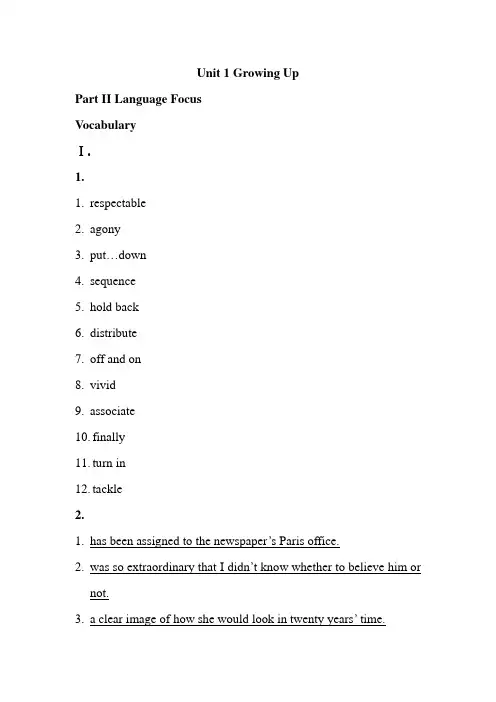
Unit 1 Growing UpPart II Language FocusVocabularyⅠ.1.1.respectable2.agony3.put…down4.sequence5.hold back6.distribute7.off and on8.vivid9.associate10.finally11.turn in12.tackle2.1.has been assigned to the newspaper’s Paris office.2.was so extraordinary that I didn’t know whether to believe him ornot.3.a clear image of how she would look in twenty years’ time.4.gave the command the soldiers opened fire.5.buying bikes we’ll keep turning them out.3.1.reputation, rigid, to inspire2.and tedious, What’s more, out of date ideaspose, career, avoid showing, hardly hold back Ⅱ.posed2.severe3.agony4.extraordinary5.recallmand7.was violating8.anticipateⅢ.1.at2.for3.of4.with5.as6.about7.to8.in, in9.from10.on/uponComprehensive Exercises Ⅰ. Cloze1.1.hold back2.tedious3.scanned4.recall5.vivid6.off and on7.turn out/in8.career2.st2.surprise3.pulled4.blowing5.dressed6.scene7.extraordinary8.image9.turn10.excitementⅡ. Translation1.1.As it was a formal dinner party, I wore formal dress, as Mothertold me to.2.His girlfriend advised him to get out of/get rid of his bad habit ofsmoking before it took hold.3.Anticipating that the demand for electricity will be high duringthe next few months, they have decided to increase its production.4.It is said that Bill has been fired for continually violating thecompany’s safety rules. /Bill is said to have been fired for continually violating the company’s safety rules.5.It is reported that the government has taken proper measures toavoid the possibility of a severe water shortage. /The local government is reported to have taken proper measures to avoid the possibility of a severe water shortage.2.Susan lost her legs because of / in a car accident. For a time, shedidn’t know how to face up to the fact that she would never (be able to) walk again.One day, while scanning (through) some magazines, a true story caught her eye /she was attracted by a true story. It gave a vivid description of how a disabled girl became a writer. Greatly inspired, Susan began to feel that she, too, would finally be bale to lead a useful life.。
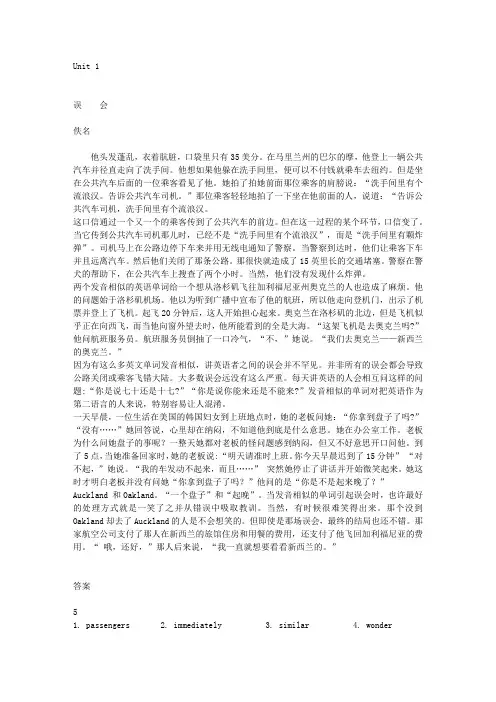
Unit 1误会佚名他头发蓬乱,衣着肮脏,口袋里只有35美分。
在马里兰州的巴尔的摩,他登上一辆公共汽车并径直走向了洗手间。
他想如果他躲在洗手间里,便可以不付钱就乘车去纽约。
但是坐在公共汽车后面的一位乘客看见了他。
她拍了拍她前面那位乘客的肩膀说:“洗手间里有个流浪汉。
告诉公共汽车司机。
”那位乘客轻轻地拍了一下坐在他前面的人,说道:“告诉公共汽车司机,洗手间里有个流浪汉。
这口信通过一个又一个的乘客传到了公共汽车的前边。
但在这一过程的某个环节,口信变了。
当它传到公共汽车司机那儿时,已经不是“洗手间里有个流浪汉”,而是“洗手间里有颗炸弹”。
司机马上在公路边停下车来并用无线电通知了警察。
当警察到达时,他们让乘客下车并且远离汽车。
然后他们关闭了那条公路。
那很快就造成了15英里长的交通堵塞。
警察在警犬的帮助下,在公共汽车上搜查了两个小时。
当然,他们没有发现什么炸弹。
两个发音相似的英语单词给一个想从洛杉矶飞往加利福尼亚州奥克兰的人也造成了麻烦。
他的问题始于洛杉矶机场。
他以为听到广播中宣布了他的航班,所以他走向登机门,出示了机票并登上了飞机。
起飞20分钟后,这人开始担心起来。
奥克兰在洛杉矶的北边,但是飞机似乎正在向西飞,而当他向窗外望去时,他所能看到的全是大海。
“这架飞机是去奥克兰吗?”他问航班服务员。
航班服务员倒抽了一口冷气,“不,”她说。
“我们去奥克兰——新西兰的奥克兰。
”因为有这么多英文单词发音相似,讲英语者之间的误会并不罕见。
并非所有的误会都会导致公路关闭或乘客飞错大陆。
大多数误会远没有这么严重。
每天讲英语的人会相互问这样的问题:“你是说七十还是十七?”“你是说你能来还是不能来?”发音相似的单词对把英语作为第二语言的人来说,特别容易让人混淆。
一天早晨,一位生活在美国的韩国妇女到上班地点时,她的老板问她:“你拿到盘子了吗?” “没有……”她回答说,心里却在纳闷,不知道他到底是什么意思。
她在办公室工作。
老板为什么问她盘子的事呢?一整天她都对老板的怪问题感到纳闷,但又不好意思开口问他。
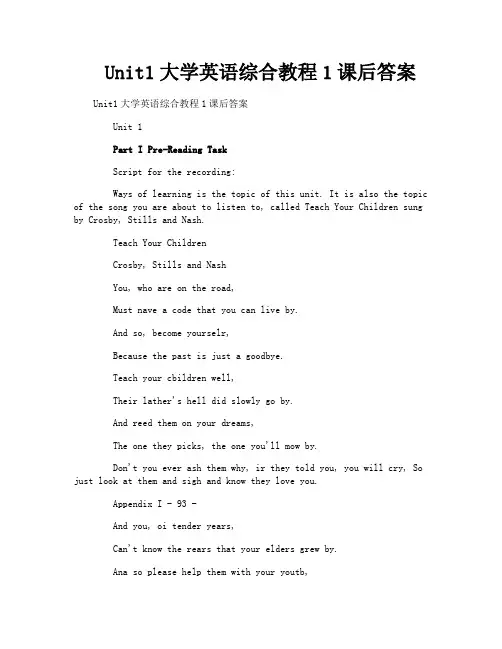
Unit1大学英语综合教程1课后答案Unit1大学英语综合教程1课后答案Unit 1Part I Pre-Reading TaskScript for the recording:Ways of learning is the topic of this unit. It is also the topic of the song you are about to listen to, called Teach Your Children sung by Crosby, Stills and Nash.Teach Your ChildrenCrosby, Stills and NashYou, who are on the road,Must nave a code that you can live by.And so, become yourselr,Because the past is just a goodbye.Teach your cbildren well,Their lather's hell did slowly go by.And reed them on your dreams,The one they picks, the one you'll mow by.Don't you ever ash them why, ir they told you, you will cry, So just look at them and sigh and know they love you.Appendix I - 93 -And you, oi tender years,Can't know the rears that your elders grew by.Ana so please help them with your youtb,They seek the truth before tbey can die.Teacb your parents well,Tbeir children's bell will slowly go by.And reed them on your dreams,Tbe one tbey picks, tbe one you'll know by.Don t you ever ask them why, ir tbey told you, you will cry, So just look at them and sigh and know tbey love you.The first part of die song is about how parents can inspiretheir children through sharing with them their dreams, their hopes for a better life. It starts with advice on how you need a set of rules, "a code diat you can live by," to guide you on the road of life. Only then will you be able to fully realise all that is within you and "become yourself." Therefore, parents need to teach their children well.And children — "you of tender years" — also have something to teach their parents, for learning is not a one-way street. Children should share their own dreams with their parents so that young and old can get to understand each otiier better.That said, one should not go too far. For some things are perhaps better left unsaid between parents and children. "Don't you ever ask them why, if they told you, you will cry." At such mo?ments all that there is left to do is to look at one another and sigh, happy in each otiier's love.Part II Text A Text Organization1. 1) The text begins with an anecdote/incident.2) His thoughts are mainly about different approaches to learning in China and the West.3) The end winds up the text with a suggestion in die form of a question.Points for Comparison/Contrast Chinese Americans1) ways to learn to accomplish a task show a child how to do something, or teach by holding his hand teach children that they should rely on themselves for solutions to problems94 - Appendix I2) attitudes to creativity and skills give greater priority to de?veloping skills at an early age, believing creativity can be promoted over time put more emphasis on fos?tering creativity in young children, thinking skills can be picked up laterVocabulary1) insert 2) on occasion3) investigate 4) In retrospect5) initial 6) phenomena7) attached 8) make up for9) is awaiting 10) exception11) not... in the least 12)promote13) working on 14) in due course15) emerged1) There is a striking contrast between the standard of livingin the north of the country andthe south.2) Natural fiber is said to be superior to synthetic fiber.3) The city's importance as a financial center has evolved slowly.4) His nationality is not relevant to whether he is a good lawyer.5) The poems by a little-known sixteenth-century Italian poet have found their way into some English magazines.3. 1) Chinese isn't a subject that can be picked up in a month. You can't accomplish your goal of mastering the language unless you work at it for years. Well, it sounds as if I'm exag?gerating thedifficulties, but the fact is I'm only telling the truth.2) The principal is somewhat disappointed with the performance of the children. From what she has gathered, some of the teaching staff have neglected their pupils. She has just announced that strict work regulations have been made and that they apply to both Chinese and overseas teachers.3) The teacher-directed and the child-directed approaches to teaching art represent two ex?tremes of opinion. Too many teacher-directed activities cannot be expected to effectively assisLchildren in learning because of the rigid structure. On the other hand, too many child-directed activities may see a curriculum that is totally unstructured and out of con?trol. There are valid reasons to believe a teacher-guided approach would be a superior wayAppendix I - 95 -to guide children's development. This approach combines some form of structure with the child leading the direction.II. Confusable Words1.1) continual 3) continual 21) principal 3) principle 5) principal2) continuous 4) continuous2) principal4) principlesIII. Usage1. themselves3. herself/by herself/on her own5. ourselves2. himself/herself4. itself6. yourself/by yourself/on your own。
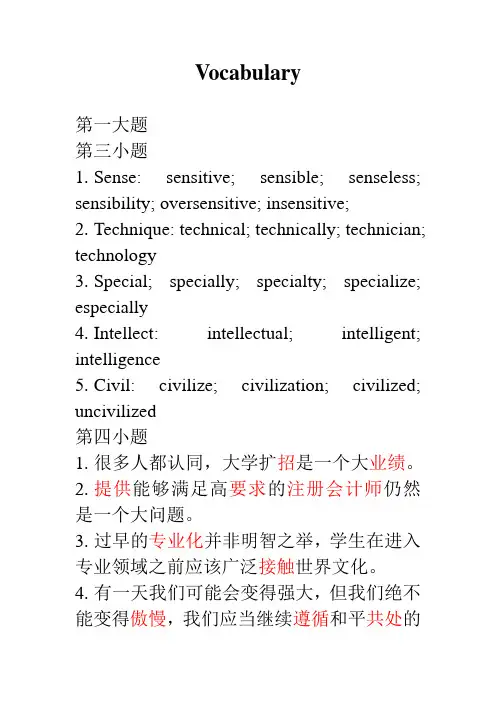
Vocabulary第一大题第三小题1.Sense: sensitive; sensible; senseless; sensibility; oversensitive; insensitive;2.Technique: technical; technically; technician; technology3.Special; specially; specialty; specialize; especially4.Intellect: intellectual; intelligent; intelligence5.Civil: civilize; civilization; civilized; uncivilized第四小题1.很多人都认同,大学扩招是一个大业绩。
2.提供能够满足高要求的注册会计师仍然是一个大问题。
3.过早的专业化并非明智之举,学生在进入专业领域之前应该广泛接触世界文化。
4.有一天我们可能会变得强大,但我们绝不能变得傲慢,我们应当继续遵循和平共处的原则。
5.一个国家的力量本质上依赖于该国的文明进程,这是一个深刻的认识。
6.我们队过去苦难的记忆是一笔巨大的精神财富。
第二大题1.Fold one’s arms2.Fold the letter3.Acquire knowledge4.Generate ideas5.Generate jobs/careers/professions6.Generate power/electricity7.Generate/arouse interest8.Employ workers9.Employ/use/make use of time10.Rear/raise/bring up one’s children/offspring11.Rear sheep12.Raise one’s family13.Raise one’s voice14.Raise tax15.Raise the question16.Maintain contact17.Maintain law and order18.Maintain peace第三大题Synonyms近义词1.Fairly: reasonably/ rather/ quite2.Obviously: clearly; evidently3.Maintain: keep4.Rear (children): raise; bring up5.Acquire (knowledge): gain; obtain6.Generate (ideas): produce7.Certify: prove8.Faculty: department (at university); teaching staff9.Mankind: humanity; human beings; man10.Pharmacist: druggist; chemist (BrE)11.Specimen: type; example; model; case; sample12.Enroll (a school): enter; join13.Nevertheless: however; but14.Penetrating: sharp; thoughtful; profound15.Intellect: thinker; intellectual16.Shudder: shake; tremble; shiver;quake17.Inevitably: unavoidably; certainly18.Aid: help; assist(ance)19.Assume: suppose; think; guess20.Peculiar: strange; odd; unusual; queer;21.Accomplishment: achievement; success; victory victorious Victoria22.Expertise: special skillAntonyms反义词1.Available: unavailable2.Arrogantly: modestly3.Specific: general4.Qualified: unqualified5.Civilized: uncivilized; savage; barbarious6.Fold: unfold7.Employed: unemployedpetence: incompetence9.Sensitive: insensitive第六大题1. It is wrong to raise our children (in)the way we grow flowers in the greenhouse. W e mustexpose them to all social problems because very soon they will be dealing with them as responsible citizens.2. As time goes on, we are inevitably going to get more and more involved in international affairs. And conflicts are sure to occur because there always exist different views and interests among nations.3. We are proud of our accomplishments, and we have reason to be. But we must never become arrogant. Otherwise/Or we will lose o urfriends.4. Information is now easily available. An average computer can store the information of an average library.5. That construction company is not qualified to handle the project. They do not have any legal document to certify that they have the necessary expertise. We must find a companythat specializes in building theaters.6. These think tanks do not make decisions. They are out to generate new ideas and penetra ting analyses that will be extremely useful for decision makers.7. The growth of GDP is not everything. Our country cannot be said to have been modernized unless the quality of our people’s lives is really improved.8. Poor as we were in many ways at that time, we were still quite happy as children, for there was clean air, clean water, a lot of fish, crabs and eels in the rivers, lakes and ponds; and a lot of flowers, trees and birds in the fields. 9. Give absolute power to any individual or any particular group of people, and that person or group is sure to Abuse/misuse power because, just as Lord Act ion says, “Power corrupts, and absolute power corrupts absolutely.”10. Traditionally in our country, school education was always said to be moreimportant and useful, compared with all other pursuits.Grammar第一大题It is far more complicated to talk about the future than to talk about the present and past. Generally speaking, future time is expressed in the following ways:Future at presentA.“will”as in 3): used to say that something is expected to happen“will be doing” as in 4): used to say that you are sure that something will happen because arrangements have been madeB.“be going to” as in 2) and 5): used to say that something will happen quite soon or to talk about sb’s intentions or what they have decided to doC.“the present progressive现在进行时”as in 10): used to talk about something will happen because you have planned or arranged itD.“the simple present一般现在时”as in 9): used to say that something will definitely happen at a particular time, especially because it has been officially arrangedFuture in the pastA.“would”as in 7): used to say what you intended to do or expected to happenB.“was/were going to”as in 1): used to say that something was expected to happenC.“was/were to do”as in 6) and 8): used to talk about something that would happen because it had been planned or arranged.第二大题第一小题1.Two nouns2.Two adjectives3.Two prepositional phrases4.Two infinitive phrases5.Two noun phrases6.Two noun phrases7.Two prepositional phrases8.Two prepositional phrases第二小题1.The province is strong both in industry and in agriculture./ The province is not only strong in industry, but also in agriculture.2.Relief agencies say the immediate problem is not a lack of food, but transportation.3.Generally, after working for the company for five years, a number of young employees either are promoted or leave. programs for children should not only entertain but also teach.5.Obviously, these children are motivated not by a desire to achieve, but by fear of failure.6.At present, it would be neither practical nor desirable to eliminate examinationsaltogether.n Americans are playing a more active role in politics than ever before, both at local and national level.8.My uncle believes that in our town sightseeing is best done either by tour bus or by bicycle.9.Wood flooring not only cleans easily, but is environmentally friendly.10.Until I read the article I knew neither where she was brought up nor (where she was) educated.11.I find the new manager neither easy to get along with nor delightful to talk to.12.Contrary to what people had expected, not only did he attend the meeting, but he also spoke for twenty minutes.第三大题(1) other (2) best (3) reason (4) mental (5) next (6) As (7) take (8) cool (9) thinking (10) rest第四大题1.T hepremier is leaving for New York for a UN= United Nations conference tomorrow.2. He is to meet the heads of state of several co untries during his stay in New York.3. what are you going to do during the Nationa l Day holidays? Are you going home or staying on campus?4. –What do you think school will be like in tw enty years’ time?- I think thatchildren will probably learn at home with a mechanized teacher.5. Thirty years ago, my grandparents never tho ught that they wouldbe able to move into a two-story house with all the modernfacilities.He is a two-year-old boy. equipment6. What they lack is not money but experience.7. They have come to China not only to learn Chinese, but(also)to learn about Chinese culture (as well).8. What children want most from their parents are not materialthings but love and attention.9. You may either write your essay in your reg ular exercisebook or do it on your computer.10. I’m not quite sure why he didn’t show up. Either he was not interested, or he simply forg ot about it.11. A society should respect both its scientists and its garbage collectors/sanitation worker.12. He is miserly both with his money and with his time.mean第五大题1.I will phone you as soon as I arrive in Beijing.2.We can hardly imagine what life will be like in 50 years.3.No mistake. Here “if...will”is possible when “will” expresses “willingness”4.Please be seated, everyone. The show is about to begin. (Note:Use “be about to do sth” to say that something will happen almost immediately. “Will” is not used.)5.It is predicted that in about ten years’ time, China will be able to send man to the Moon. (Note:“To be able to do sth”is used to say that it is possible for someone or something to do something.)6.Drop in whenever you please. You’ll always be welcome. (Note:Adverbs of frequency频率副词, such as always, usually, often, sometimes, etc., usually go immediately in front of the main verb.)7.Neither his parents, nor his brother was able to come to his performance.(Note:The main verb agrees with the noun phrase introduced by nor就近原则)8.Both her friends and her English teacher believe she will win the talent contest.9.My father regards creativity both as a gift and as a skill. (Note: Normally, the two items connected by emphasizing coordinating conjunction s并列连词should be expressed in the same grammatical form, here, two prepositional phrases.)10.No mistake. Though the two items “do it now”and “after class”aren’t the same grammatical form, this is acceptable because we can regard them as condensed form “We can either do it now or (do it)after class.”Therefore, the two items can also be different grammatical forms serving the same grammatical function, here, both as adverbials.。
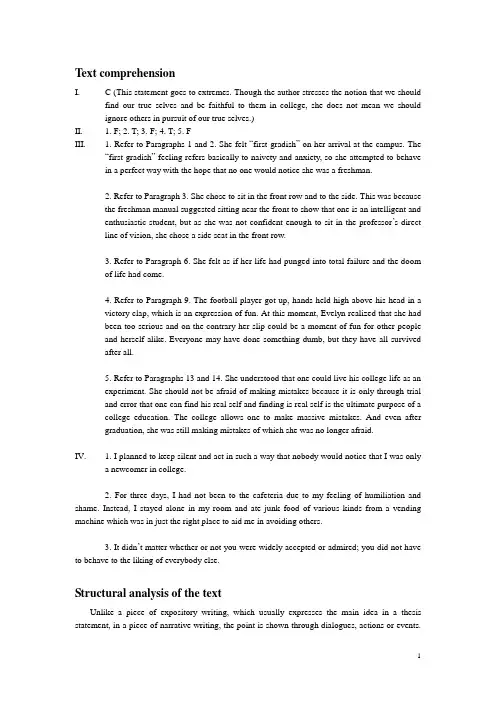
Text comprehensionI. C (This statement goes to extremes. Though the author stresses the notion that we shouldfind our true selves and be faithful to them in college, she does not mean we should ignore others in pursuit of our true selves.)II. 1. F; 2. T; 3. F; 4. T; 5. FIII. 1. Refer to Paragraphs 1 and 2. She felt “first-gradish” on her arrival at the campus. The “first-gradish” feeling refers basically to naivety and anxiety, so she attempted to behave in a perfect way with the hope that no one would notice she was a freshman.2. Refer to Paragraph3. She chose to sit in the front row and to the side. This was becausethe freshman manual suggested sitting near the front to show that one is an intelligent and enthusiastic student, but as she was not confident enough to sit in the professor’s direct line of vision, she chose a side seat in the front row.3. Refer to Paragraph 6. She felt as if her life had punged into total failure and the doomof life had come.4. Refer to Paragraph 9. The football player got up, hands held high above his head in avictory clap, which is an expression of fun. At this moment, Evelyn realized that she had been too serious and on the contrary her slip could be a moment of fun for other people and herself alike. Everyone may have done something dumb, but they have all survived after all.5. Refer to Paragraphs 13 and 14. She understood that one could live his college life as anexperiment. She should not be afraid of making mistakes because it is only through trial and error that one can find his real self and finding is real self is the ultimate purpose of a college education. The college allows one to make massive mistakes. And even after graduation, she was still making mistakes of which she was no longer afraid.IV. 1. I planned to keep silent and act in such a way that nobody would notice that I was onlya newcomer in college.2. For three days, I had not been to the cafeteria due to my feeling of humiliation and shame. Instead, I stayed alone in my room and ate junk food of various kinds from a vending machine which was in just the right place to aid me in avoiding others.3. It didn’t matter whether or not you were widely accepted or admired; you did not have to behave to the liking of everybody else.Structural analysis of the textUnlike a piece of expository writing, which usually expresses the main idea in a thesis statement, in a piece of narrative writing, the point is shown through dialogues, actions or events.The three incidents that are treated expansively in this essay are related to one another by their implicit messages—the author made mistakes and her reaction toward the mistakes. It was in this process that the author achieved significant insight into life and herself.Rhetorical features of the text“I knew everyone would stare. Forget it. I settled into my chair and tried to assume the scientific pose of a biology major, bending slightly forward, tensing my arms in preparation for furious note-taking, and cursing under my breath”(Paragraph 5). “Keeping myself upright and getting out of the mess was not going to be easy, and this flailing of my feet was doing no good. Just as I decided to try another maneuver, my food tray tipped and I lost my balance” (Paragraph 6). The italicized parts in the selections offer vivid pictures of what she did or how she looked in the embarrassing situations.VocabularyI. Explain words1. I had just the feeling of a newcomer at college without the strength a mature student might possess2. my apparent confidence3. some food to appease my hunger (as well as my anxiety)4. going with the tide was no longer crucial to one’s success5. foolish and glaring mistakesII. Fill in the blank1.distress2.clutched3.pose4.sneaked5.preoccupation6.shackles7.curse8.deliberationIII. Fill in the blank1.assure2.discretion3.relaxation4.humiliate5.strategy6.embarrassment7.maneuverable8.immaturityIV. Fill in the blank1.lived up to2.headed for3.seek out4.has broken out5.groped for6.trying…on7.go out to8.tipped offV. synonym and antonym1.vague (indistinct)2.inconspicuously (unobtrusively)3.self-restraint (self-control)4.clever (intelligent, sensible)5.manner (behavior)6.excited (agitated)7.sneak8.mature (sophisticated)VI. Explain in your own words1.became popular2.respect3.keep up4.lead to5.understand6.founde8.startFocus of the unitI. (There are five main types of nominal clauses: that-clauses, interrogative subclauses, nominal relative clauses, nominal to-infinitive clauses and nominal –ing clauses. Nominal clauses function like noun phrases. They may serve as subject, object, complement, appositive, and prepositional complement.)1. c2. d3. b4. f5. a6. e7. h8. gII. Rewrite the sentences1.My decision to resign was wise.2.Their readiness to accept the peace agreement really surprised the diplomatic world.3.My determination to pass the test helped me.4.Her failure to get into college disappointed her parents.5.My willingness to cooperate was appreciated.6.His refusal to help surprised me.7.The proposal that we should import more equipment is to be discussed at the meeting.8.Who can have told you that puzzles me.III.1. D2. B3. C4. C5. A6. B7. D8. BIV.1.I spent the afternoon seeking out each of my classrooms so that I could make a perfectlytimed entrance before each lecture.2.He wore glasses and a false beard so that nobody would recognize him.3.The stranger spoke very slowly so that I could understand what he said.4.She locked the door so that she wouldn’t be disturbed.5.John whispered so that others couldn’t hear him.6.Please arrive early so that we can start the meeting on time.7.John has bought a bicycle so that he may save money on bus travel.8.The lecturer showed some slides so that he might illustrate his point.V.1. Although/ Though2. yet3. however/ though4. however/nevertheless/though5. Although/Though…still/nevertheless6. Despite/In spite of7. although/though8. however9. However10. Despite/In spite ofVI. omittedTranslationI.1. 事实上,不管我如何摆出一副成熟的样子,我感觉自己还是有一点大一新生的菜鸟气。
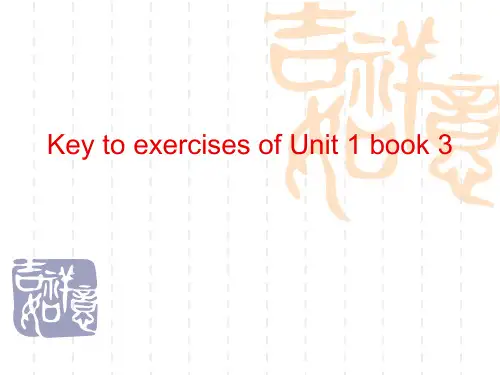
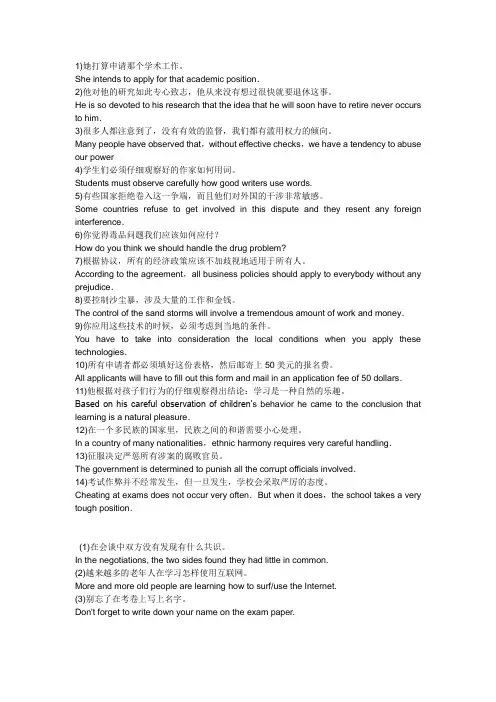
1)她打算申请那个学术工作。
She intends to apply for that academic position.2)他对他的研究如此专心致志,他从来没有想过很快就要退休这事。
He is so devoted to his research that the idea that he will soon have to retire never occurs to him.3)很多人都注意到了,没有有效的监督,我们都有滥用权力的倾向。
Many people have observed that,without effective checks,we have a tendency to abuse our power·4)学生们必须仔细观察好的作家如何用词。
Students must observe carefully how good writers use words.5)有些国家拒绝卷入这一争端,而且他们对外国的干涉非常敏感。
Some countries refuse to get involved in this dispute and they resent any foreign interference.6)你觉得毒品问题我们应该如何应付?How do you think we should handle the drug problem?7)根据协议,所有的经济政策应该不加歧视地适用于所有人。
According to the agreement,all business policies should apply to everybody without any prejudice.8)要控制沙尘暴,涉及大量的工作和金钱。
The control of the sand storms will involve a tremendous amount of work and money.9)你应用这些技术的时候,必须考虑到当地的条件。
UNIT1TEENAGE LIFESection C Discovering Useful Structures&Listening and Talking课后篇巩固提升必备知识基础练Ⅰ.指出下面句子中的画线的短语是什么类型的短语1.The red of the flag symbolizes revolution;the stars are yellow so that they will stand out brightly against the red ground.2.The little girl ran back home,happy and satisfied.3.Gradually though,they somehow found the money.I realised later that they did this by going without themselves.4.The new measures that have been taken show China’s sense of responsibility as a majorcountry.5.Parents worry about the effect of music on their adolescent’s behaviour.Ⅱ.完成句子1.她很粗鲁地回答问题。
She answered the question .2.我母亲对这项服务相当满意。
My mother was .3.达成一致的结果太严重了。
The results of agreement were .4.他们的房子就在海边。
They have a house .5.我有时候可怜那些住在大城市的人们。
I sometimes pity people .6.请递给我那本封皮坏了的书。
Please hand me .7.琼斯总是比其他学生到得早。
UNIT1TEENAGE LIFESection A Listening and Speaking课后篇巩固提升必备知识基础练Ⅰ.单句语法填空1.Schools need (volunteer) to help children to read.2.The question of the origin of the universe is still hotly (debate).3.He made a small (move) with his right hand.4.Would now be a (suit) moment to discuss my report?5.There are lots of people there who can (actual) help you.6.My idea is we shall act on his suggestion.7.This is we used to swim when we were kids.8.What I want to know is won the contest.Ⅱ.完成句子1.约翰几天前加入了一个足球俱乐部。
John a few days ago.2.我想知道您是否愿意下星期来我们家做客。
you’d like to visit us next week.3.我们可以想象出这是一件多么重要的工作!We can imagine !4.这本书的内容简单,适合儿童。
The simple content of the book .5.问题是他什么时候能到酒店。
The question is .关键能力提升练Ⅲ.阅读理解AA student had to get his long hair cut off in a middle school in Guangdong Province.It was talked a lot among teachers and students.In fact,all schools have their own rules.In most schools,boy students are not allowed to have long hair while girls are not allowed to dye their hair.And most school rules say that students should wear their school uniforms at school.And students must obey these rules so that they can get healthy development at school.But some students have disagreements.They think that boy students having long hair doesn’t mean that they are not good students.They want to show their own personality.They think that they would look cool too if they had long hair and the hairstyles like their favorite stars.A girl student thought that she would look much more beautiful if she had brown hair.So she had her dark hair dyed brown one day.When she went back to school the next day,the teacher was very angry with her.She said that she worked hard at her lessons and did well in every subject.She just didn’t know why the teacher didn’t allow her to dye her hair while women teachers can.It is not wrong for teenagers to love stars’ hairstyles or wear their favorite clothes.However,a school has its own rules for all the students to obey so that the school can be in good order.Students should not break the rules at school.【语篇导读】这是一篇议论文。
新编实用英语综合教程1课后翻译答案(Unit 1-Unit 5 )UNIT 11像许多人一样,你大概也在学习如何推销自己•You, like most people, probably are leanning how to market yourself.2对一名新雇员来说,最重要的不一定是工作经验,而是怎样不断更新知识。
To a new employee, the most importa nt is not n ecessarily work experie nee, but how to update kno wledge.3对不起,我那位闲不住的老板让我立刻就走。
I'm so sorry. My go-go boss asks me to leave right now.4那位主妇只是不停地诉说她的家事,我就知道我会被拉进这样的谈话。
That housewife just eontinued on with some sort of story about her family. I knew I must be eaught in such a conv ersati on.5对我来说,失去时间就是失去生命。
我不能还没实现自己设定的目标就离开这个世界。
For me, missed time is missed life. I can not leave this world without reaching the goal I set.6我的锻炼计划是建立在每天锻炼基础上的,它不一定会让我长高,但会使我身体健康。
My exercise plan is built on a daily basis. It could help me become healthier, not n ecessarily taller.1. 像你的许多同学一样,你可能也曾有过亲身经历:有人请求你为外国友人帮忙做点事像大部分妇女一样,她自己可能也曾遭遇过被人误解的局面。
人教PEP版五年级英语上册Unit 1 第1课时课后练习题(带答案)教科书第4页:A. Let’s try Let’s talkⅠ.选出不同类的单词。
( ) 1. A. tell B. tall C. know( ) 2. A. funny B. teacher C. student( ) 3. A. he B. she C. our( ) 4. A. Miss B. who C. Mr( ) 5. A. great B. yes C. noⅡ.英译汉。
1. Mr Young __________________2. our music teacher _________________3. Is she kind?__________________4. He’s old. __________________5. I like funny teacher. __________________Ⅲ.单项选择。
( ) 1.-Do you know Miss Wu? -No, I_________.A.amB.doC.don’t( ) 2.Who_________ your Chinese teacher?A.doB.isC.does( ) 3.I like_________friends.A.funB.funnyC.funnily( ) 4.-Is your English teacher kind? -Yes, _________.A.she’sB.he’sC.she is( ) 5.Our maths teacher is a _________ man.A.friendlyB.friendsC.friendⅣ.读句子,判断句子内容是(T)否(F)与图片相符。
( ) 1.This is my sister, Lucy. She’s friendly.( ) 2.This is our English teacher. She’s kind.( ) 3.This is our music teacher. He’s old.( ) 4.I like our PE teacher. He’s tall.( ) 5. Mr Wang is our Chinese teacher. He’s young.Ⅴ.选择正确答语。
Unit1 Where did you go on vacation?课后练习题雅鲁河学校:刘胜广1、单项选择1.--_____ did Dave go on vacation?-- He went to the mountains.A.WhatB. WhenC. WhereD. How2.Few of them wanted to take a bus there, ___________?A. do theyB. don’t theyC. did theyD. didn’t they3. --- you your homework yet?--- Yes. I it a moment ago.A. Did;do;finishedB. Have;done;finishedC. Have;done;have finishedD. Will;do;finish4.——Where ______ he go on vacation?——He went to the mountains.A.is B.does C. has D. did5. --- did you go last week?--- We went to Beijing.A. WhoB. WhenC. Where6.I noticed a man go _____________ the gate and didn’t come out until midnight.A. overB. throughC. across7.People in the UK say “holiday” while people in the USA say “ ”. A. yard B.vacationC. truckD. soccer8. —How was your school trip last weekend?—Wonderful! We enjoyed __________ very much.A. itB. usC. myselfD. ourselves9.– Where did she go on vacation?– .A. She stays at homeB. She visits her uncleC. She went to New YorkD. She wants to go to Hainan10.My aunt arrived ______ Guangzhou ______ the morning of March 13.A. at; inB. in; onC. in; inD. to; on2、完形填空It was a Saturday afternoon. The weather was very and nobody wanted to stay at home. Timmy decided to go swimming in the river. His brother, Bob, wanted to go with you. “ him with you, Timmy,” said their father, “ and you must him well.”When they got to the river, they saw a lot of people in it. Some people had great fun playing in the water. Timmy told Bob to play on the bank, and then he into the water. About an hour later, Timmy swam back to the bank with a fish in his hand. Bob was very . He found a bottle and put the fish into it. Then they went home.Bob didn’t do anything else that evening. He just watched the in his own room. Suddenly Timmy heard Bob in the room. He ran to him and asked,” What’s the matter with you, Bob?” “The fish is dead.” Bob said, “I thought it was , so I took it out of the and put it on the chair. I only wanted it to have a good rest.”11.A. warm B. hot C. cool D. cold12.A. Carry B. Bring C. Take D. Catch13.A. look after B. find out C. worry about D. turn on14.A. washing B. running C. resting D. swimming15.A. ran B. walked C. fell D. jumped16.A. happy B. angry C. sad D. sorry17.A. sky B. bottle C. TV D. fish18.A. singing B. crying C. smiling D. laughing19.A. tired B. sick C. hungry D. thirsty20.A. table B. river C. bottle D. Bag三、阅读理解Last week I went to London for a holiday with Jenny.We got there by plane on Monday morning and took a taxi to our hotel. In the afternoon we went for a walk in Hyde Park.On Tuesday we saw Big Ben and Buckingham Palace.The next day we visited the British Museum and had supper in a Chinese restaurant!On Thursday morning we relaxed. Then we went to Tower Bridge by boat on the River Thames and looked at the city.On the last day I did some shopping and Jenny listened to a concert in the park. After I went back to the hotel, I sent some emails to my friends.阅读短文,判断下列句子的正误。